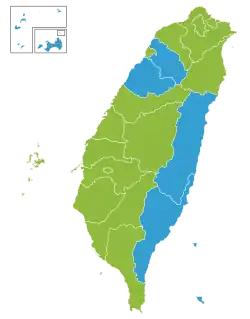The election of the president and vice president of Taiwan (Chinese: 中華民國總統、副總統選舉) is a universal direct election through secret vote by the citizens of Taiwan (ROC) in the Taiwan Area. ROC presidents are elected by relative majority (plurality), meaning the candidate with the most votes wins without a runoff requirement.[1][2] The most recent election took place on January 13, 2024.
- The Presidential and Vice Presidential Election and Recall Act[3] states that a candidate for president or vice president must be a citizen of the Republic of China, at least 40 years old, and a resident of Taiwan for a period of no less than 15 years with a physical presence of no less than 6 consecutive months.
- The following persons shall not be registered as candidates for the president:
- Military personnel
- Election officials
- People who hold foreign nationality or who hold residency of the People's Republic of China
- People who have restored their nationality or acquired their nationality by naturalization
- The president and vice president are nominated on a joint ticket. Political parties which have gained at least 5% of the votes in the last presidential or legislative election may nominate a set of candidates directly. For example, during the 2012 elections, only the Kuomintang and Democratic Progressive Party were qualified to nominate candidates through this rule. Alternatively, candidates may be nominated by a petition signed by eligible voters numbering no less than 1.5% of the electors in the last legislative election. (This equals 252,848 signatures for the 2012 election.)[3]
List of presidential elections in Taiwan
| President | Election year | Winner | Other candidates |
|---|---|---|---|
| 9 | 1996 | Lee Teng-hui (Kuomintang) – 54.00% | Peng Ming-min (Democratic Progressive) – 21.13% Lin Yang-kang (Independent) – 14.90% Chen Li-an (Independent) – 9.98% |
| 10 | 2000 | Chen Shui-bian (Democratic Progressive) – 39.30% | James Soong (Independent) – 36.84% Lien Chan (Kuomintang) – 23.10% |
| 11 | 2004 | Chen Shui-bian (Democratic Progressive) – 50.11% | Lien Chan (Kuomintang) – 49.89% |
| 12 | 2008 | Ma Ying-jeou (Kuomintang) – 58.45% | Frank Hsieh (Democratic Progressive) – 41.55% |
| 13 | 2012 | Ma Ying-jeou (Kuomintang) – 51.60% | Tsai Ing-wen (Democratic Progressive) – 45.63% James Soong (People First) – 2.77% |
| 14 | 2016 | Tsai Ing-wen (Democratic Progressive) – 56.12% | Eric Chu (Kuomintang) – 31.04% James Soong (People First) – 12.84% |
| 15 | 2020 | Tsai Ing-wen (Democratic Progressive) – 57.13% | Han Kuo-yu (Kuomintang) – 38.61% James Soong (People First) – 4.26% |
| 16 | 2024 | Lai Ching-te (Democratic Progressive) – 40% | Hou Yu-ih (Kuomintang) – 33% Ko Wen-je (Taiwan People's Party) – 26% |
 Electoral maps of Taiwanese direct presidential elections. |
 Election results of the 2020 Taiwanese presidential election. |
 Comparison of the vote percentages in the direct presidential elections. Other independents
|
See also
References
- ↑ "Factbox: How does a Taiwan election work?". Reuters. 2020-01-07. Retrieved 2022-05-11.
- ↑ Bush, Richard C. (December 18, 2023). "Explaining Taiwan's 2024 presidential election". The Brookings Institution. Retrieved 2024-01-13.
- 1 2 "Presidential and Vice Presidential Election and Recall Act".
This article is issued from Wikipedia. The text is licensed under Creative Commons - Attribution - Sharealike. Additional terms may apply for the media files.